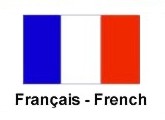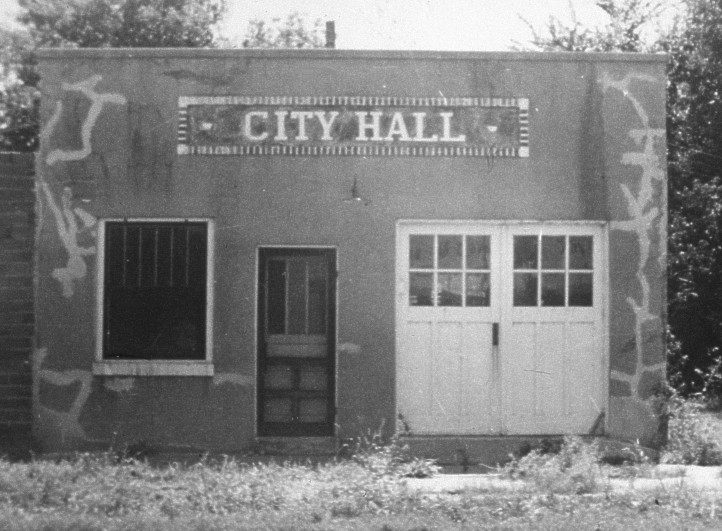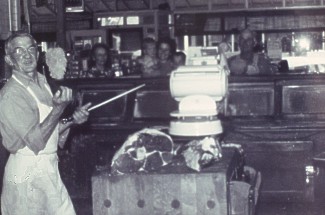Morganville City Hall became a collection point for shoes and clothing donations.
In Carson's September 1 letter to Todd, she mentioned that the local UNESCO organization would be electing a secretary and
treasurer to handle matters relating to their sister city. The former post was filled by Mrs. Helen (Young) Hanson, whom
Carson described as "granddaughter of a Ruegg girl, Greek dancer, band member, farmer's wife, and awfully nice person"
and Carson was confident she "is going to bring order out of chaos."
The treasurer's position was taken by Daniel Roenigk. He had been in both world wars and ran an insurance agency in Morganville.
Morganville's Mayor Emette Davis was having health problems and soon Roenigk would replace him in that role.
After the people of Morganville recovered from their pageant efforts, it was time for the real work to begin. After the
bills were paid, the net income from the August 27 event was $586.89 - a significant sum in a time when a single dollar
purchased 12 hamburgers.
The money would go further than it might seem because purchased goods were bought in bulk. Donations of old clothing and
shoes were sought. The consequence was much of the cash would be spent on shipping between Morganville and the port of
New York and the packing charges at the port. American Aid to France would then take over and pay for the shipping
across the ocean as well as transportation to Fèves.
Donations were taken to the City Hall. Items made of cloth were sorted. If the item was in good shape, it was sent as it was.
If not, it was used as scraps for blankets, comforters and layettes. If needed, items were first cleaned by a professional
laundry. If there were just a few holes, they would be mended. Donated shoes were similarly inspected and repaired, if needed.
"My room became a sewing room," said Carson. "We made woolen comforter-squares out of old pants. Sometimes a man
would come in to take a last look at his suit. 'Lot of good wear left in it yet.'"
Because the Germans had either taken their cattle or slaughtered them, the citizens of Fèves were desperate
for fats. While the people of Morganville used much of theirs for cooking, they had an excess. So Ed Schwab at
Oetinger's Meat Market was placed in charge of collecting any lard that could be spared.
There was also a desperate need for milk for Fèves' children. But while Morganville had an excess of it as well,
it was too heavy to ship and would not have arrived in any fit condition to consume. So it was necessary to use
some of the precious money to purchase milk in powdered form to ship. The question then became, how
much should be bought?
Dan Roenigk's sister-in-law Florence Roenigk had been trained as a dietician, so Carson asked her to calculate what a reasonable
ration of milk would be for six months for 60 youngsters. More than a barrel of powdered milk would be required and the price tag
was $124.88 - more than 20 percent of the money in the treasury.
Carson's September 1 letter reached Todd in New York two days later. Todd immediately replied. It is clear by the tone
of both letters that they were becoming friends, but the letters are still written in a somewhat formal way.
Telephone Murray Hill 6-4986
OPERATION DEMOCRACY, INC.
369 Lexington Avenue New York 17, N.Y.
September 3, 1948
Miss Velma Carson
Morganville, Kansas
Dear Miss Carson:
Just prior to clearing out of town for a Labor Day fling at the striped bass off Cape Cod, we would like to take this
opportunity to inform you that O. D. loves Morganville. The radio program was magnificent. Strong men wept, and
several women decided to "remove" to Kansas. The real pay-off, however, is the thought of getting cookies from the
Ruegg girls.
For some reason, Bob Sonkin started back to New York via Louisville, and from last reports, he got no further.
Consequently, we have not yet had a first-hand report, or heard any of the recordings. His voice on the Mutual
[radio network] broadcast contained an ill-concealed note of triumph, however, so we know all went well.
I am very happy to hear about the State Senator et. al. who liked the idea. If you have any people in mind to whom
we should send material, please let us know.
The wheels of affiliation will undoubtedly roll very slowly for a while for it sometimes takes a little while for the
French towns to understand exactly what is happening. They begin with the assumption that Americans are all crazy and
for a while they will try to humor you. Later, they will catch on. Above all, don't be discouraged by sudden requests
for a bull-dozer, three tractors and a grain elevator. Our movies, magazines and tourists have convinced the French
that every one of us has a swimming pool and seven servants, and it takes time to convince them otherwise. A couple
of good scrap books about Morganville, prepared by your school kids, would be an excellent addition to your shipment.
Some day, you might want to consider bringing a young French farm boy over here to learn something about Kansas
farming. If you do, let us know and we'll try to pull some strings on free transportation.
Regarding the actual shipping problem, don't let American Aid to France worry you with their long and complicated
instructions. They are fine people and do a good job - but if for any reason you question their procedure, packing
charges, etc., let us know and we will take it up with them. Their distribution system is good. They have an American
Staff in Paris who are very alert to any problems of black market, unfair distribution, etc., and their record so far
has been a hundred per cent successful.
Well, I haven't really much to say beyond how very grateful we are. I hope all of you will keep in touch with us, and
that you will let us help where we can.
Very Sincerely,
Charles L. Todd
Executive Secretary
Three elements of this letter deserve comment. The first is Todd's mention that the "wheels of affiliation will
undoubtedly roll very slowly for a while." Morganville had yet to hear from Fèves, but Fèves had yet to receive anything
either. But Todd was suggesting that even after a shipment arrived, a delay in receiving a response was to be expected.
In regard to American Aid to France, Todd mentions their tendency to be rather particular in how they handle things. As
of the writing of this letter, it was not a concern. That would change!
Finally, the last sentence is a sort of gentle "Farewell." Once begun, most sisterships were turned over to the two
cities to carry on. But the Morganville-Fèves pairing would prove to be different.



